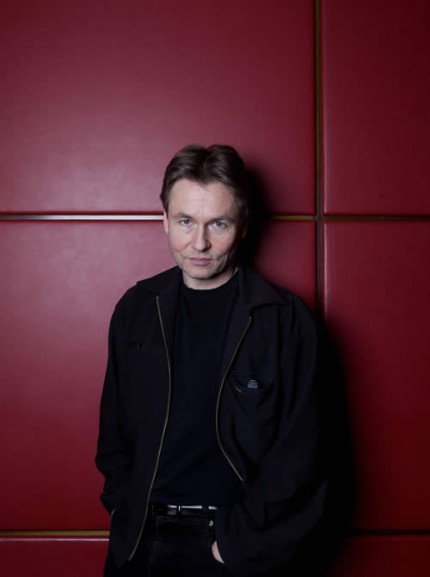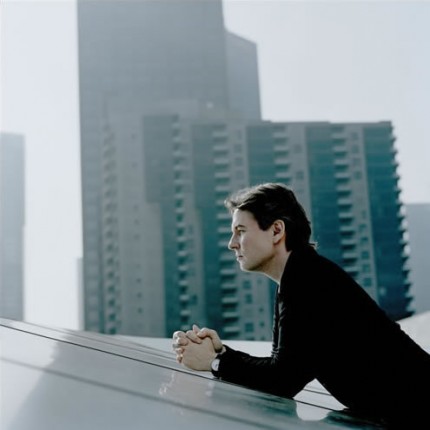Post-L.A., Esa-Pekka Salonen looks to take up new challenges

Esa-Pekka Salonen opens a two-week stand with the Chicago Symphony Orchestra tonight. Photo: Karen Robinson
It’s been nearly two years since the Finnish conductor and composer Esa-Pekka Salonen moved to London from Los Angeles, where he enjoyed an unprecedented 17-season tenure as music director of the Los Angeles Philharmonic. And the transition has not been without challenges.
“I can’t say the move has been easy,” Salonen says, speaking by mobile phone from a cab earlier this month as he left London – where since late 2008 he has been principal conductor and artistic advisor of the Philharmonia Orchestra – to prepare for a concert in Paris devoted to his music. “To move one’s entire family and all operations to a different continent is a huge undertaking, of course. I think we are only now starting to settle in.”
Yet Salonen by no means expects to sever his American ties. Besides his continuing connection to the L.A. Philharmonic – he is the orchestra’s first conductor laureate – and his other guest-conducting appearances in the U.S., his eldest child now attends college in New York.
“I don’t think we will ever become 100 percent European again,” he said. “We will be in the States always. The kids grew up there, and for them the U.S. is home with a capital ‘H’ – no question about that. So it’s a different sort of experience. I enjoy being back in Europe because I can do things I couldn’t do in L.A. with all the weeks I was devoting to the orchestra there.”
The biggest change in his conducting career involves opera. “I’m doing more than ever before,” he said, noting that his next operatic engagement is a production of Janáček’s The Makropulos Case with the Vienna Philharmonic in Salzburg. There are also plans for a new production of Strauss’s Elektra to be directed by Patrice Chereau at Aix-en-Provence in 2013. “That was the one thing I was not doing enough of when I was in L.A., and now that I’m back in Europe it’s easier to get back into.”
But L.A.’s distance from much of the classical music world brought unexpected advantages as well. “The city is so far away that if one has a week or 10 days off, the idea of doing a gig in Europe is not very attractive,” the conductor said, “because of the jet lag. Whereas, when you’re living in Europe, everything is local in a way. So living that far away turned out to be a stabilizing factor for me, because I ended up spending more time with my family than I do now.”
Tonight, Salonen, 52, begins two weeks of concerts with the Chicago Symphony Orchestra (his eighth and ninth subscription series with them), renewing a relationship that dates back to January 1988. The programs mark his first time with the ensemble since Riccardo Muti became music director in September last year, but he does not expect to find marked changes.
“In technical terms, I think it’s unlikely for an orchestra to experience a major a shift in so short a time,” he said. “But these matters are not entirely technical. They are also mental and spiritual. And the sheer idea of having a conductor of the caliber of Muti is an inspiration.
“Of course, the CSO sounded pretty damn good before this. It’s not as though the orchestra had to be raised out of an artistic slump – not at all.”
The conductor evinces real fondness for this ensemble, which he lauds as “very spirited,” adding, “I’m not talking about the obvious – like the level of the individual players; that’s a given, of course. But they are very proud of their reputation and tradition, and they take every task and challenge incredibly seriously. It’s a superbly professional group of people, and despite the reputation and the tradition, they are very gentle, warm, easygoing people. And that’s a rare combination of qualities to have without arrogance. So it’s a special group.”
A highlight of Salonen’s first program (to be performed tonight, Thursday and Saturday) is the local premiere of his own Violin Concerto, with Leila Josefowicz as soloist. The piece – commissioned by the CSO, the L.A. Philharmonic and New York City Ballet – was supposed to have its world premiere in Chicago in early 2009, but the composer could not complete the score in time, so the premiere occurred several months later in L.A.
“Concentration was a challenge,” Salonen recalls, pointing to the pressures he faced as he prepared to leave the City of Angels and the longtime music directorship that propelled him to international fame. The piece was subsequently performed in New York last June as the underscore for Peter Martins’ ballet Mirage.
Yet Salonen maintains that there is “an upside” to his concerto’s delayed arrival in the Windy City. “The piece has been played about 12 times so far, and I’ve been able to iron out whatever kinks there were,” he says. “There weren’t that many in this case, but both Leila and I have quite a bit of experience with the animal now. And experience helps with performing a new piece, even if you happen to write it yourself.”

Photo: Kaskara/DG
Salonen’s second program (running March 3 through 6) also features a relatively new work, this one by the Italian composer Franco Donatoni, who was one of the conductor’s teachers. The piece, Donatoni’s last, is dedicated to Salonen and titled Esa (In cauda V).
“The whole story is quite touching,” says Salonen. “When Donatoni was writing this piece he was gravely ill. So he dictated it to his students, who were sitting at his bedside and taking notes. I knew he was ill, and I did not expect he would finish the piece, or even start it. No one told me he’d been working on it. I only knew he had died, and I sent condolences to his widow.
“Then a few months later, there was a package in the mail, and it was the score. It was a message from beyond the grave, as it were. That he chose my name as the title was deeply touching. I was sort of stunned by the jolly character [of the music], and I thought, ‘Way to go!’”
Earlier this season, Salonen returned to Los Angeles for the first time since Gustavo Dudamel succeeded him as music director. He had chosen not to appear in L.A. during Dudamel’s first season as an act of respect. But, given the long absence, he wasn’t quite sure what to expect from his old orchestra, or how he would react to seeing his former colleagues again.
“It was kind of funny because I had no idea how I would feel and how they would feel, and how the whole thing would feel,” he says. “What happened was: I walked through the door and the guards greeted me as though, well, ‘How’ve you been?’ It was not a dramatic return. Okay, the man is back.
“And it was the same thing with the orchestra. I was very pleased to see them, and they seemed to feel the same about seeing me. But it didn’t feel particularly momentous.”
The conductor attributes the bonhomie to the easy transition engineered by the orchestra’s president, Deborah Borda. “The key to this is that we parted on very good terms,” Salonen says, referring to the orchestra. “I tried not to overstay my welcome – though 17 years is a pretty good term. I was pleased to see how much enthusiasm there is for what Gustavo was doing, and no insecurity about the future among the players. For me to sense this from a body of musicians that had been my main focus for 17 years is great. The worst kind of thing that could happen is that they would be insecure or unhappy, but it is absolutely on the contrary.
“And it gives me a lot of satisfaction, too, to see that a certain type of work I did is being taken further and developed by someone of Gustavo’s caliber. A conductor could not ask for anything more. He’s a wonderful guy and a good colleague. But I’m very pleased also that my successor is someone with whom I feel this connection.”
Esa-Pekka Salonen leads the Chicago Symphony Orchestra this week in Debussy’s Prelude to the Afternoon of a Faun, Sibelius’ Symphony No. 2 and his Violin Concerto with Leila Josefowicz as soloist. Performances are 6:30 p.m. Wednesday (minus the Debussy), 8 p.m. Thursday and 8 p.m. Saturday.
He also conduct the CSO March 3-6 in Wagner’s Prelude to The Meistersinger, Donatoni’s Esa (In cauda V) and Bruckner’s Symphony No. 7, and will lead the Civic Orchestra Feb. 28 in Scriabin’s Poem of Ecstasy and works of Sibelius. cso.org; 312-294-3000.
David Mermelstein writes regularly about music for the Wall Street Journal, the Los Angeles Times, BBC Music Magazine and MusicalAmerica.com. For a decade he wrote feature stories and reviewed recordings for The New York Times. He is also a contributor to the most recent edition of The New Grove Dictionary of Music and Musicians and the co-author of the “American Tradition” chapter in The Cambridge Companion to Conducting.